I have been wanting to delve back into the world of Saturday Night Live for a while...especially after my previous posts based around the show got more views than a lot of my content.
The truth is I get the sense that due to the show's longevity and the legend around it makes it seem like certain topics to discuss may have been beaten to death.
And yet, here I am...ready to talk about the infamous 6th season of SNL that aired from 1980-1981.
I do want to try to talk about other eras and performers from SNL, especially seasons that may have been bad or weak or maybe were the years that the show began to find itself again.
Season 6 is the first season of SNL that followed the original 1975-1980 team and after a series of unfortunate events that paled in comparison to those from Lemony Snicket, the show had lost Lorne Michaels as its leader.
So much has been written about this whole process whether it had been from magazine/newspaper articles, or books, or other online blogs that devoting so much time to the backstory may not be worth it.
I will recommend checking out one particular book as it was the first thing that truly introduced me to the chaotic drama of the 1980 changeover and how brutal the process had been.
This would be Saturday Night: A Backstage History of Saturday Night Live written by Doug Hill & Jeff Weingrad.
Now, other online posts such as those by Bronwyn Douwsma or podcasts like That Week in SNL have delved into little mini reviews of episodes from that and other seasons.
I would like to do the same because I feel like watching the 6th season under a modern lens is rather fascinating. My intention of this post is to try to do a brief overview of the drama that led to this season and then (over a series of posts) go on a play by play of the 12 episodes of the season that were produced by the now successful film and theatre producer Jean Doumanian.
As I mentioned, this would've been the season that followed the departure of Lorne Michaels, the remaining original cast members, and most of the writers except for Brian Doyle-Murray.
1980 was a particularly tumultuous time for NBC as this was during the infamous reign of Fred Silverman, who had led the other major networks CBS and ABC to great success while NBC floundered in the ratings and became the biggest joke in the entertainment world.
Silverman was not a fan of SNL or of Lorne Michaels and how much he was able to get away with due to how beloved he was by the previous NBC President Herbert Schlosser, who was one of the bigger champions of the show at a time when a lot of the network just didn't get it.
Silverman and his cronies didn't truly understand how much of the show's success was due to the leadership of Michaels and after a truly botched attempt in trying to renew his contract, it seemed as though Michaels was going to step aside.
The hope was that the show, if it were to continue, would be produced by someone closely linked to the writing staff on hand with Michael's preference being the writer/performer duo of Al Franken & Tom Davis...BUT...in one of the final episodes of the 1979-1980 season, Al Franken did a Weekend Update bit called "Limo for a Lame-o" which completely obliterated Fred Silverman and how he was a "total and unequivocal failure".
While Lorne Michaels didn't find the piece that funny, Franken insisted it was and Michaels let it on air without much of a fight. Current Vice President of Programming (and eventual NBC savior) Brandon Tartikoff was one of the few people on Silverman's team who loved and supported the show...and he happened to be in the audience that night and LOVED the bit. When Silverman saw it at home, he angrily called the studio trying to find Tartikoff who told the NBC page "Tell him I'm not here".
This led to Franken/Davis being out of the equation as successors, but Michaels didn't really offer any other serious contenders. In fact, he shot down the idea of Jean Doumanian, who had been suggested by one of Silverman's advisors Barbara Gallagher, a former writer turned producer who was a close friend of Doumanian and...ironically enough...previously held the position within the show that Doumanian had held since the middle of the first season.
Doumanian had the title of Associate Producer, but in reality, she was essentially the Talent Coordinator who helped book the show and would make sure the cast and the host were taken care of. In truth, she may have had an "eye for talent" so to speak but she had no real experience at producing nor did she have any real sense of comedy or how to write.
Barbara Gallagher insisted to Tartikoff that Doumanian's eye for finding talent would be crucial if trying to hire new cast members and writers. This push led Tartikoff to offering Doumanian the job, and effectively caused Michaels and anyone left from the original team to abandon any idea of a return.
As is quoted in the Hill/Weingrad book, Doumanian "now presided over a shell of the show".
So, with that all in place, let's fast forward to November 1980.
The show's 6th season had been delayed due to election coverage as NBC often used Studio 8H for that coverage. It also allowed a lot of prep time behind the scenes for this mostly new team of cast members, writers, and producing team.
As the season premiered, the show already had an air of insecurity around it.
Word had already gotten out that things were a little bit tense and awkward in the offices when one writer by the name of Peter Tauber tried to assert himself as a leader but was met with extreme opposition by Doumanian and her inner circle.
The interesting thing about Doumanian is that she, much like the network, didn't seem to understand the enormity of the task she was given. Maybe she did to an extent, but she has been quoted by her friends and even herself that it was "a challenge" but that is what would make it fun.
Tauber claimed he asked Doumanian if she was scared of the process, and she said "No". Tauber also claimed that Doumanian seemed to try so hard at acting like Lorne Michaels down to the things she would say or how she would handle people that it was like "walking into a widow's house".
Doumanian tried to assert herself as something of a head writer and even though she herself didn't write; she insisted her name be included in the credits as being a part of the writing staff. While she did technically hire a head writer, Mason Williams of Smothers Brothers Comedy Hour and Classical Gas fame, she didn't allow him any true creative freedom and a lot of his ideas were killed before making it to air.
The writing staff was eclectic but didn't seem to have extensive experience in writing sketch comedy. She would insist that a lot of the writers couldn't collaborate together unless she paired them herself...which seems rather bizarre to me. She did pair two writers together which did lead to an eventual fruitful partnership: Barry Blaustein & David Sheffield, who she claimed she felt would come up with "interesting" ideas as Blaustein was Jewish and Sheffield was from the South.
I mean...okay?
Although, the two of them would go on to be the writers who would best showcase Eddie Murphy so in this case, she managed to stumble into success.
And speaking of Eddie Murphy, he is easily one of the most fascinating examples of casting in the show's history because it is such a perfect of example of someone getting pushed to the side due to complete disrespect and obliviousness to his talent...and then that talented person getting the last glorious laugh.
The season began with just 6 cast members: 3 women and 3 men...and no credited featured players as of yet.
These were:
Denny Dillon
- a comedian and theatre actress
--------
Gilbert Gottfried
- a brash NY comic who, almost instantly, came into the show with some pause.
-------
Gail Matthius
- a comedian/stage performer who was focused on doing character work
--------
Joe Piscopo
- another comic who excelled at doing impersonations.
--------
Ann Risley
- mostly a stage actress who frankly did not seem to grasp the concept of comedy.
--------
Charles Rocket
- a former news anchor turned actor who had impressed with the team with his "man on the street" video bits and presented himself as a performer with a style that was compared to Chevy Chase and especially Bill Murray.
______________________________
When looking at these cast members, you might actually know a lot of them.
The late Charles Rocket would go on to have a respectable career as a character actor in film and television, memorably as Bruce Willis' brother on Moonlighting and his roles in movies like Dumb & Dumber (in a comedic villain role) and Hocus Pocus.
Gail Matthius is one of the most beloved voiceover actresses in the business, best known for her work as Martha Generic on Bobby's World.
The late Gilbert Gottfried, who speaks in his natural voice during this season, would go on to be known for his offensive and brash comic material.
Denny Dillon would become a Tony-nominated actress who would be a part of one of HBO's first successful series, Dream On. In fact, when she was nominated for a Tony for her work in the Tommy Tune-directed Gershwin jukebox musical My One & Only, a lot of local NY newscasts would bring up the SNL debacle in her interviews to which she would respond delicately about how the press hurt but that she moved on: "Time heals everything" she said with a smile during one interview.
And then you have Joe Piscopo...who is now a right-wing radio personality who hosts a daily radio show in NYC.
I left out Ann Risley because she is easily the one cast member that doesn't have a lot of name value in today's entertainment world.
At the time, Risley only really acted in regional theatre but by a crazy twist of fate, ended up in the circle of Woody Allen, who convinced her to move from Wisconsin to NY. He immediately cast her as an extra in his films Annie Hall, Manhattan, and Stardust Memories.
To this day, I have seen those films (particularly Annie Hall) multiple times and I have yet to remember seeing her in any of them.
When you look at Ms. Risley's credits, you will see that after SNL, she managed to book a couple of prominent Broadway gigs such as the famous production of Come Back to the Five & Dime Jimmy Dean, Jimmy Dean that featured Cher or starring in a forgotten play called A Small Family Business opposite the legendary Angela Lansbury.
But by 1984, she ended up moving to Tucson, AZ where she opened an acting conservatory called The Studio for Actors, which she ran up until the COVID pandemic hit and she seemingly entered into retirement.
I mentioned that Risley didn't seem to have a grasp for comedy. So why and how did she get hired?
Well...guess who was best friends with Jean Doumanian at that time?
Woody Allen.
When reading the Hill/Weingrad book, the behind-the-scenes portions of the prep leading up to the season premiere make both Ann Risley and Charles Rocket seem like major prima-donnas.
Joe Piscopo was quoted as saying that Charles Rocket's demeanor right off the bat was "immediately: sunglasses". In fact, this didn't seem to be helped by the fact that Doumanian was convinced that Rocket was going to be her first major star due to his charisma and how much he embodied the spirit of former cast members Chevy Chase and Bill Murray.
In truth, Charles Rocket DID have talent...but I don't think that the talent he had was cultivated in a healthy way as he was not properly trained in the world of sketch/improv comedy.
And it didn't help that he seemed to instantly put his trust into Doumanian, who seemed to blame all of her problems on the writers and he agreed that they were failing him, her, the cast, and the show.
Quick sidenote: Jean Doumanian's lack of comedic expertise was one of the true fatal flaws of this season as she couldn't properly give advice or constructive criticism on sketches that might have worked under the hand of an experienced comic writer/producer.
One of the most infamous moments of the early season prep was that she often gave one of three notes to sketches submitted on her desk:
"Make it funnier".
"It isn't hip enough. Make it hipper".
or my favorite...
"I don't get it".
Don't get me wrong: there are many times from this season where I watched in pure horror at how misguided a lot of the content was. I still think the worst sketch in the entire history of the series comes from this season.
However, there are many times where the ideas do work but the execution is what suffers...or the writers find success in unlikely places...which I will go into more when I discuss the episodes in full.
I think a lot of the blame can be placed on the writers, but this all has to fall back on Doumanian in not finding people who were necessarily ready to write in this setting...because she did not have the skills needed to curate her team.
I got sidetracked for a moment, but Doumanian's desire to bash the writers became the biggest theme of drama behind the scenes and Rocket took it upon himself to join her in that fight.
Then you have Ann Risley, who seemed so aloof and ill-suited for the material she was often given that within the first couple of episodes, she makes very little impression with what she is given (aside from one role in a sketch she does with host Malcolm McDowell in the second episode).
In that same Hill/Weingrad book, Risley is described as being particularly rude and demeaning to then uncredited featured player Eddie Murphy, whose story I plan to go into more when I discuss his first appearances.
(NOT TO MENTION...his story within this season is pretty well known so I feel like I won't need to dwell on it as much)
Risley was said to have actually asked Murphy to grab her some juice as if he was some kind of assistant, and when he callenged her, she condescendingly scolded him by saying "I am an actress! I have done Shakespeare, I have done Woody Allen!"
First of all, I work as a theatre actor for those who don't know...but I have never done Broadway or Film/TV. All of my work has been very "on the fringes"...but I have done Shakespeare plays.
NEVER...EVER...would I ever consider doing Shakespeare regionally or even off-Broadway in NY as a reason to demean anyone in the manner that this supposedly occurred with Risley.
When watching Risley's performances in her brief 12-episode tenure and having this knowledge of her behavior backstage, you marvel that she even made it this far into the process and you wish for her to fail.
When the first episode of the season premiered on November 15, 1980, there was already blood in the water...but looking back on it, while aspects of the episode may show some promise that might've been completely hard to see at that time, I think there is a lot of truth to the criticism that the show received at that time.
I can't guarantee how fast I will get these posts up, but this is essentially the prologue to what will be 12 additional posts going into each episode of the infamous 12-episode of the Jean Doumanian era followed by...potentially...an epilogue.
So these will be posts devoted to the following episodes:
11/15/80 - Elliott Gould
________________________
11/22/80 - Malcolm McDowell
_______________________________
12/6/80 - Ellen Burstyn
________________________________
12/13/80 - Jamie Lee Curtis
___________________________________
12/20/80 - David Carradine
__________________________________
_________________________________
___________________________________
01/24/81 - Robert Hays
___________________________________
02/07/81 - Sally Kellerman
_____________________________________
__________________________________
02/21/81 - Charlene Tilton
___________________________________
03/07/81 - Bill Murray
__________________________________
I really want to try to discuss each of these episodes at length...and provide video clips if possible.
I think that this season is a fascinating one because when it truly is bad, it gives us some of the worst and ill-conceived sketches to have ever been on the show, but on the flip-side, I still think some of the cast members who got discarded after this season would've worked a lot better under better leadership.
Also - one of my favorite sketches in the show's history also comes from this season which is kind of remarkable in its own right.
Out of all of the legendary seasons of SNL to be considered the lowest of the low (6, 11, 20, and I will place 30 in that group too), I still think 6 is the one that has something of an excuse and often makes me wish they had a little more time to grow.
Stay tuned for my review of the premiere episode hosted by frequent host of the original era, Elliott Gould.

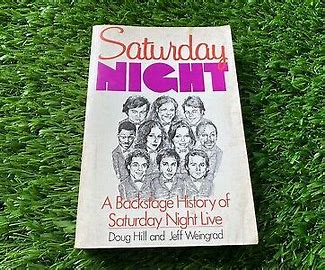







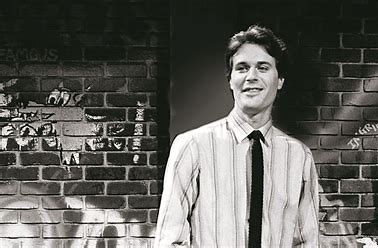




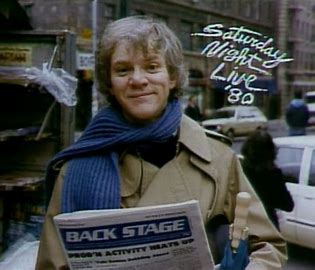
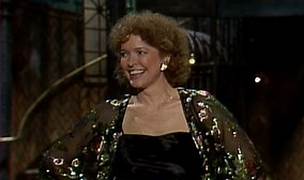







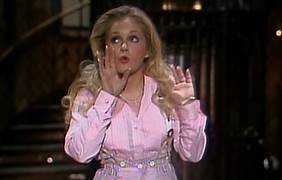

No comments:
Post a Comment